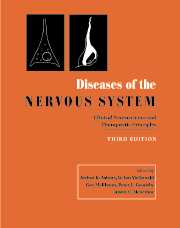Book contents
- Frontmatter
- Dedication
- Contents
- List of contributors
- Editor's preface
- PART I INTRODUCTION AND GENERAL PRINCIPLES
- PART II DISORDERS OF HIGHER FUNCTION
- PART III DISORDERS OF MOTOR CONTROL
- PART IV DISORDERS OF THE SPECIAL SENSES
- PART V DISORDERS OF SPINE AND SPINAL CORD
- PART VI DISORDERS OF BODY FUNCTION
- PART VII HEADACHE AND PAIN
- PART VIII NEUROMUSCULAR DISORDERS
- PART IX EPILEPSY
- PART X CEREBROVASCULAR DISORDERS
- PART XI NEOPLASTIC DISORDERS
- PART XII AUTOIMMUNE DISORDERS
- PART XIII DISORDERS OF MYELIN
- PART XIV INFECTIONS
- PART XV TRAUMA AND TOXIC DISORDERS
- PART XVI DEGENERATIVE DISORDERS
- PART XVII NEUROLOGICAL MANIFESTATIONS OF SYSTEMIC CONDITIONS
- 121 Neurological aspects of pregnancy
- 122 The brain and the cardiovascular system
- 123 Neurological complications of hepatic and gastrointestinal disease
- 124 Renal disease and electrolyte disturbances
- 125 Disorders of intracranial pressure
- 126 Neurologic manifestations of endocrine disease
- 127 Neurological manifestations of hematological diseases
- 128 Neurocutaneous syndromes
- 129 Neurological complications after organ transplantation
- Complete two-volume index
- Plate Section
124 - Renal disease and electrolyte disturbances
from PART XVII - NEUROLOGICAL MANIFESTATIONS OF SYSTEMIC CONDITIONS
Published online by Cambridge University Press: 05 August 2016
- Frontmatter
- Dedication
- Contents
- List of contributors
- Editor's preface
- PART I INTRODUCTION AND GENERAL PRINCIPLES
- PART II DISORDERS OF HIGHER FUNCTION
- PART III DISORDERS OF MOTOR CONTROL
- PART IV DISORDERS OF THE SPECIAL SENSES
- PART V DISORDERS OF SPINE AND SPINAL CORD
- PART VI DISORDERS OF BODY FUNCTION
- PART VII HEADACHE AND PAIN
- PART VIII NEUROMUSCULAR DISORDERS
- PART IX EPILEPSY
- PART X CEREBROVASCULAR DISORDERS
- PART XI NEOPLASTIC DISORDERS
- PART XII AUTOIMMUNE DISORDERS
- PART XIII DISORDERS OF MYELIN
- PART XIV INFECTIONS
- PART XV TRAUMA AND TOXIC DISORDERS
- PART XVI DEGENERATIVE DISORDERS
- PART XVII NEUROLOGICAL MANIFESTATIONS OF SYSTEMIC CONDITIONS
- 121 Neurological aspects of pregnancy
- 122 The brain and the cardiovascular system
- 123 Neurological complications of hepatic and gastrointestinal disease
- 124 Renal disease and electrolyte disturbances
- 125 Disorders of intracranial pressure
- 126 Neurologic manifestations of endocrine disease
- 127 Neurological manifestations of hematological diseases
- 128 Neurocutaneous syndromes
- 129 Neurological complications after organ transplantation
- Complete two-volume index
- Plate Section
Summary
Renal disease can affect neurological function either directly, through the effects of retained uremic toxins, or indirectly through complications of renal failure or its treatment (Fraser & Arieff, 1994). With the exception of urological and ultimately nephrological complications of spinal disease or autonomic neuropathy, nervous system disorders rarely affect the kidney. Some systemic disorders may affect both the kidneys and the brain. These are discussed under the headings uremic encephalopathy (acute and chronic), uremic neuropathies and myopathy, complications of therapy for uremia and systemic disorders.
Uremic encephalopathy
Uremia is a clinical syndrome related to profound loss of renal function. Uremic encephalopathy is divided into acute (ARF) or chronic (CRF) varieties. These differ more than in acuity, as a number of metabolic and endocrine disturbances and compensatory adjustments take time to fully evolve in CRF. Some may ameliorate and others contribute to adverse effects of kidney failure on the CNS.
Acute uremic encephalopathy
Acute renal failure (ARF) can be divided into prerenal (circulatory failure), post renal (obstructions to outflow) and specific renal causes (Conger & Schrier, 1975). At least 40% of ARF cases occur in an acute medical setting (Hou, 1983).
Clinical features
There are few specific features that differentiate uremic encephalopathy from other metabolic encephalopathies. However, the following combination suggests uremia, after the exclusion of exogenous agents: (i) an encephalopathy with hyperventilation from a metabolic acidosis; (ii) excitability, including prominent myoclonus or seizures.
As with other metabolic encephalopathies, early changes include lethargy, irritability, problems with concentration and attention, disorientation, omissions in speech and sleep disturbances (Locke et al., 1961). Patients are usually subdued, but delirium, or an agitated confusional state, may be found. There may be periods of profanity, euphoria, depression or catatonic stupor (Wilson, 1940). Coma from acute uremia is found when the patient is in extremis (Gowers, 1888).
Cranial nerves are usually intact, although fundi may reflect arterial hypertension. Seizures, usually in the form of generalized convulsions and often multiple, occur in the oliguric phase (Locke et al., 1961). Focal seizures are not usually consistently from the same site, unless they relate to an associated structural lesion. Patients may feel weak and demonstrate multifocal myoclonus that is so prominent that the muscles appear to be fasiculating (Plum & Posner, 1980).
- Type
- Chapter
- Information
- Diseases of the Nervous SystemClinical Neuroscience and Therapeutic Principles, pp. 1987 - 2015Publisher: Cambridge University PressPrint publication year: 2002



